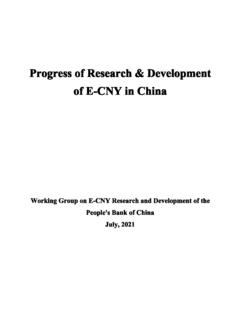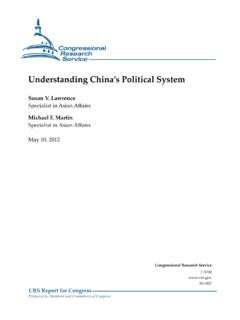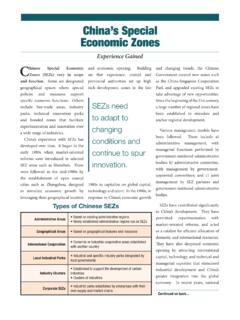Transcription of Law of the Peoples Republic of China on the People’s Bank ...
1 1 Unofficial translation Law of the People s Republic of China on The People s Bank of China (Adopted at the Third Session of the Eighth National People s Congress on 18 March 1995, and revised in accordance with the Decision on Amending the Law of the People s Republic of China on the People s Bank of China adopted by the Standing Committee of the Tenth National People s Congress at its 6th Meeting on 27 December 2003.) Contents Chapter 1 General Provisions Chapter 2 Organizational Structure Chapter 3 The Renminbi Chapter 4 Business Operations Chapter 5 Financial Regulation Chapter 6 Financial Affairs and Accounting Chapter 7 Legal Liabilities Chapter 8 Supplementary Provisions Chapter 1 General Provisions Article 1 This Law is formulated to define the status of and make clear the functions and responsibilities of the People s Bank of China , ensure the correct formulation and implementation of the monetary policy of the State, establish and improve a macro-economic management system through a central bank, and maintain financial stability.
2 Article 2 The People s Bank of China is the central bank of the People s Republic of China . The People s Bank of China shall, under the leadership of the State Council, formulate and implement monetary policy, prevent and resolve financial risks, and maintain financial stability. Article 3 The objective of monetary policy is to maintain the stability of the value of the currency and thereby promote economic growth. Article 4 The People s Bank of China shall perform the following functions and responsibilities: (1) promulgating orders and rules related to the fulfillment of its functions and 2 responsibilities; (2) formulating and implementing monetary policy in accordance with the law; (3) issuing the renminbi (RMB) and supervising its circulation; (4) regulating the inter-bank lending market and the inter-bank bond market; (5) administering foreign exchange regulation and supervising the inter-bank foreign exchange market; (6) regulating the gold market; (7) holding and managing the foreign exchange and gold reserves of the State; (8) managing the State treasury; (9) maintaining the normal operation of the payment, clearing and settlement systems.
3 (10) providing guidance and making plans for the fight against money laundering in the financial industry and being responsible for monitoring the movement of funds for the purpose of anti-money laundering; (11) being responsible for statistics, survey, analysis and projection concerning the financial industry; (12) engaging in relevant international financial activities in its capacity as the central bank of the State; and (13) other functions and responsibilities prescribed by the State Council. In order to implement monetary policy, the People s Bank of China shall carry out financial operations in accordance with the relevant provisions of Chapter 4 of this Law. Article 5 The People s Bank of China shall submit to the State Council for approval its decisions concerning the annual money supply, interest rates, exchange rates and other important matters specified by the State Council and implement these decisions.
4 The People s Bank of China shall promptly implement its decisions on matters concerning monetary policy other than those specified in the preceding paragraph, and file them with the State Council for record. Article 6 The People s Bank of China shall submit work reports to the Standing Committee of the National People s Congress on the conduct of monetary policy and the operations of the financial sector. Article 7 The People s Bank of China shall, under the leadership of the State Council, independently implement monetary policy, perform its functions and responsibilities, and carry out business operations according to law, free from interference by local governments, government departments at various levels, social organizations or individuals. Article 8 The People s Bank of China is wholly funded and owned by the State. Article 9 The State Council shall establish a coordination mechanism for financial 3 regulation.
5 The specific measures thereof shall be provided for by the State Council. Chapter 2 Organizational Structure Article 10 The People's Bank of China shall have a Governor and a number of Deputy Governors. The candidate for the Governor of the People s Bank of China shall be nominated by the Premier of the State Council and decided upon by the National People s Congress; when the National People s Congress is not in session, the candidate for Governor shall be decided upon by the Standing Committee of the National People s Congress. The Governor shall be appointed or removed by the President of the People's Republic of China . The Deputy Governors of the People s Bank of China shall be appointed or removed by the Premier of the State Council. Article 11 The People s Bank of China shall institute a system wherein the Governor assumes the overall responsibility.
6 The Governor shall direct the work of the People s Bank of China , and the Deputy Governors shall assist the Governor in his/her work. Article 12 The People s Bank of China shall establish a Monetary Policy Committee. The functions and responsibilities, composition and working procedure of the Committee shall be provided for by the State Council and filed with the Standing Committee of the National People s Congress for record. The Monetary Policy Committee of the People s Bank of China shall play an important role in the macro-economic management of the State, and the formulation and adjustment of monetary policy. Article 13 The People s Bank of China shall establish branch offices as representative organs based on the need to perform its functions and responsibilities and exercise centralized leadership and administration over the branch offices.
7 The branch offices of the People s Bank of China shall, as authorized by the People s Bank of China , maintain financial stability and undertake relevant operations in their respective districts. Article 14 The Governor, Deputy Governors and other staff members of the People s Bank of China shall fulfill their duties diligently. They must not abuse power or conduct malpractice for private ends. They must not assume concurrent positions in any financial institutions, enterprises or foundations. Article 15 The Governor, Deputy Governors and other staff members of the People s Bank of China shall keep State secrets according to law and be obligated to keep the secrets of the financial institutions and individuals that are involved in the implementation of central bank functions and responsibilities 4 Chapter 3 The Renminbi Article 16 The legal tender of the People s Republic of China is renminbi (RMB).
8 The renminbi is used to repay all public or private debts within the territory of the People s Republic of China , and no organization or individual shall refuse . Article 17 The unit of renminbi is yuan and the units of the fractional currency of renminbi are jiao and fen. Article 18 The note and coins of renminbi shall be printed, minted and issued by the People s Bank of China . The People s Bank of China shall publicly announce the issuance date, face value, design, pattern and specifications of a new edition of renminbi notes and coins. Article 19 It is prohibited to counterfeit or alter notes and coins of renminbi. It is prohibited to sell or purchase counterfeit or altered renminbi notes and coins. It is prohibited to transport, hold or use counterfeit or altered renminbi notes and coins. It is prohibited to deliberately destroy or damage renminbi notes and coins.
9 It is prohibited to illegally use any design or pattern of renminbi notes and coins in advertising materials, publications or other commodities. Article 20 No organization or individual shall print or issue coupons as substitutes for the notes of renminbi to circulate on the market. Article 21 The damaged or soiled notes of renminbi shall be exchanged in accordance with the rules of the People s Bank of China . The People s Bank of China shall be responsible to withdraw from circulation and destroy such notes. Article 22 The People s Bank of China shall establish a renminbi issuing treasury and shall also establish subsidiary issuing treasuries in branch offices. The subsidiary issuing treasuries shall allocate the renminbi issuing fund at the instruction of the treasury at the next higher level. No organization or individual shall use the issuing fund in violation of relevant laws or regulations.
10 Chapter 4 Business Operations Article 23 To implement monetary policy, the People s Bank of China may use the following monetary policy instruments: (1) requiring banking financial institutions to place deposit reserves at a prescribed ratio; (2) deciding on the benchmark interest rates of the central bank; (3) providing discount services to banking financial institutions that have opened accounts in the People s Bank of China ; (4) providing loans to commercial banks; 5 (5) purchasing and selling central government bonds and other government securities, financial bonds, and foreign exchange on the open market; and (6) other monetary policy instruments decided by the State Council. The People s Bank of China may prescribe specific conditions and procedures to use the monetary policy instruments listed in the preceding paragraph in order to implement monetary policy.











